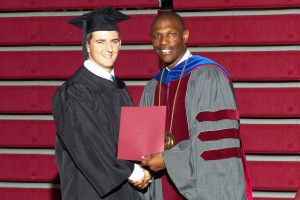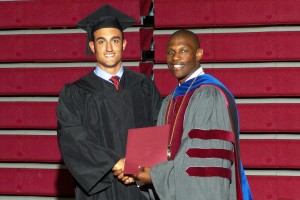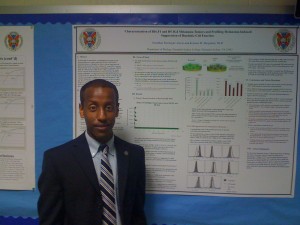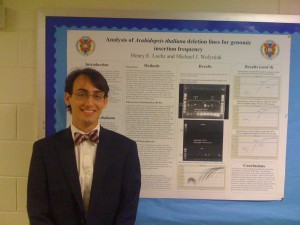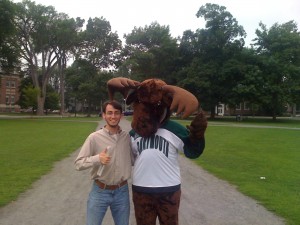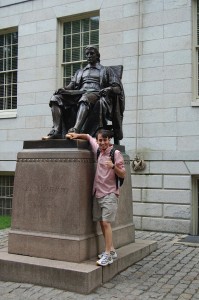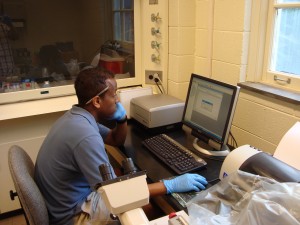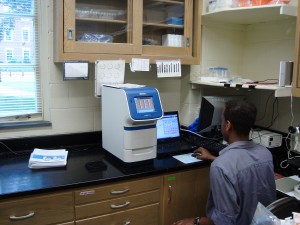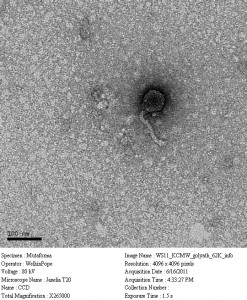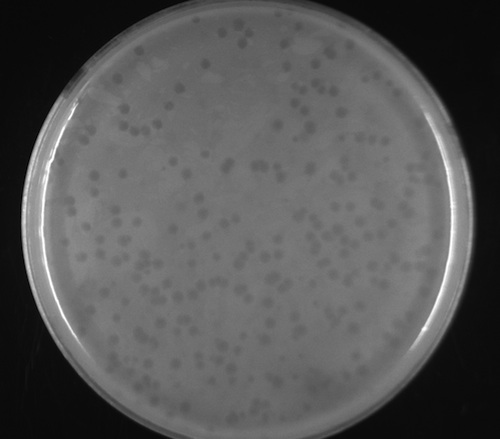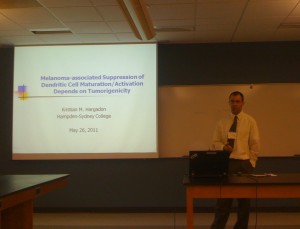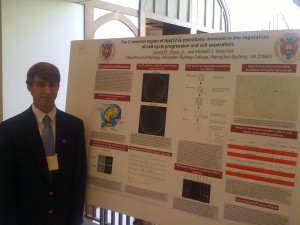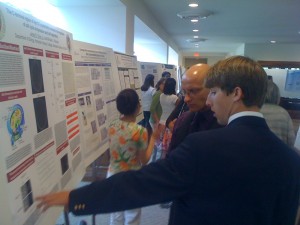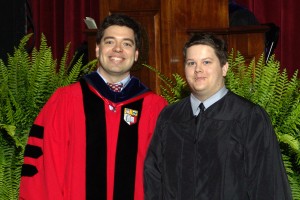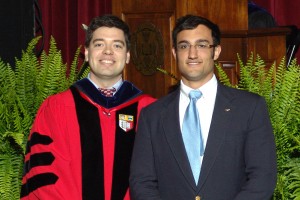The Biology Department is pleased to congratulate two of its seniors for receiving awards for their academic excellence at Hampden-Sydney’s Opening Convocation. Burke Best ’12 received the President’s Award for Overall Academic Excellence while Raj Clark ’12 received the President’s Award for Academic Excellence in the Natural Sciences and Mathematics.
Author Archives: admin
H-SC summer research poster presentation
2 Hampden-Sydney students recently presented their summer research projects at the College’s annual Honors Council summer research poster session. Yonathan Ararso ’13 presented his work with Professor Krisrtian Hargadon that explored immune response to cancer cells in mice:
Also presenting was Henry Loehr ’13, who worked with Professor Mike Wolyniak on developing techniques to screen for the number of mutations in lines of Arabidopsis thaliana, a plant commonly used in genetics research:
A summer in the aquarium and the dentist’s office
Here, Carter Mavromatis ’12 describes two different biological training experiences from this past summer:
I have been working at the Virginia Aquarium and Marine Science Center in Virginia Beach with a lead chemist from Texas up in the water quality lab. Here I had to maintain the proper water conditions for the collection of marine invertebrates, fishes, sea turtles, harbor seals, etc. After initial training, I was allowed to work independently. We tested basically everything you could think of having to do with water quality, including pH, alkalinity, and salinity, as well as the presence of fecal matter, ammonia, nitrate, nitrite etc. I also did a ton of dissections for displays and research. I dissected isopods, turtles, sharks, cobia, and sea robins, to name a few. I even got some dental experience there by pulling some of their teeth! Lastly, I went out on the aquarium fishing boats where we took groups of visitors and summer campers out into the Chesapeake Bay to do a little fishing. We would throw out troll nets, reel in whatever we caught, and do a brief overview of the animals present. It was an awesome experience.
Since I am interested in dental school, I been doing a lot of shadowing and working at the Dental Red Cross. At the Red Cross, every Tuesday and Thursday patients who are not fortunate enough to have dental insurance can come in for dental work that they could otherwise not afford. For instance, some patients come in, point to the tooth thats hurting them, and we yank it out. Tuesdays are the extraction days and Thursdays are the operative days. During these days, at least one dentist takes time out of their day to perform the procedures. It is all volunteer work there, so no one gets paid, but it’s nice to give back to the community. Other than that, I have been in plenty of offices (oral surgeons, periodontists, general dentists) and have seen almost all aspects of the dental world, which is helpful to get a feel for if I would like to specialize and if so, in what field. I have really enjoyed oral surgery so that is something I might consider.
Summer Research at Dartmouth Medical School
By Henry Loehr ’13
HANOVER, NH–This has been a busy summer for me as a Hampden-Sydney student. I went to Argentina to study Spanish during May Term. When I got back to the States, I had my wisdom teeth taken out. As soon as I healed, I was off to Hanover, New Hampshire for an entire month of biology research with Dr. Mike Wolyniak, my genetics professor last spring. During the school year, I discussed with Dr. Wolyniak the possibility of doing genetics research over the summer. Dr. Wolyniak was kind enough to work with me in developing a plan that would allow me to do both. I would accompany him to Hanover, New Hampshire and work in a lab at Dartmouth Medical School during the month of July. I eagerly accepted this amazing opportunity.
I enjoy travel and Hanover has not disappointed. The small town atmosphere coupled with the energy of a college town charmed me immediately. There are plenty of different places to eat, shop, or just sit and read. The town is a haven for anyone who enjoys outdoor activities such as canoeing, hiking, (in my case) running, or fishing.
My average day starts with cross country training in the morning, to avoid the heat of the afternoon, before I go into work at nine. That being said, the weather while I have been here in the Upper Valley of New Hampshire has been absolutely superb. The temperature is a cool 85˚F when I get out of the lab. During the afternoons I spend my free time exploring Dartmouth’s expansive and beautiful campus, listening to live music, or reading outside and enjoying the (cooler than Virginia’s) summer weather.
My work is on Arabidopsis thaliana, a small plant used as a model organism for genetic study. My job is to extract the DNA from leaf samples of plants. I prepare this DNA for a polymerase chain reaction (PCR). After the reaction is complete, the DNA is loaded and pulled through an agarose gel with an electric current. This project is part of a larger project that I will continue this upcoming school yea to help understand the genetics of this model plant. Three other schools (Barnard College, College of Charleston, and the University of Georgia) are also working on this joint research venture.
Summer dental assistantship training with the Army Medical Division
By Jonathan Gammon ’12
FORT SAM HOUSTON, TX–I am stationed temporairly at Fort Sam Houston, Texas, as part of the Army Medical Division (AMEDD). While here I am going through a dental assistant school, which is accelerated and will be completed in 8 weeks. The class has both hands-on learning and classroom learning which is divided into different days according to the instructors’ discretion. Class begins at 0830 and we retire from class at 1630. At this point we are released for the day upon completion of marching back to the company area. The class is a very interesting class and I am doing very well in it at this time thanks to the preparedness I have recieved at H-SC. I currently am averaging a 98 in the class and am in line to be an Honor Graduate which would be a huge honor for me. Throughout the class we are learning the anatomy of the head, periodontal diseases, oral diseases, and the proper instruction on how to use instruments on patients teeth. The dental assistant is the one who hands the dentist his supplies, makes the fillings and composites, and aids in surgical procedures as a second pair of hands for the dentist. This class is going very fast with much being thrown at you every day, but is a blast.
Yonathan Ararso ’13, Dr. Kristian Hargadon Studying Immunity to Melanoma
As part of the College’s Summer Research Program, rising junior Yonathan Ararso has been collaborating with Dr. Kristian Hargadon to investigate the production of immunosuppressive factors by melanoma cells and to study the influence of these factors on the activity of dendritic cells, a group of cells responsible for the induction of immune responses. Previous work in Dr. Hargadon’s laboratory has established that melanoma tumor cells suppress the function of dendritic cells, and such dysfunction is likely to have severe consequences for the induction and maintenace of a variety of other anti-tumor immune responders. Funded by a Summer Undergraduate Researc Fellowship from the Virginia Foundation for Independent Colleges, Yonathan is using a variety of cutting-edge techniques that include real time RT-PCR, ELISA, and flow cytometry to identifying a number of melanoma-derived molecules with known immunosuppressive function. He is also testing the effects of these molecules on tumor-associated suppression of dendritic cell activity through antibody blockade experiments. These experiments are designed to individually assess the role of each candidate tumor-derived factor in the suppression of dendritic cell function. Using this approach to gain insights into the mechanism of tumor-induced suppression of dendritic cells may potentially identify tumor-derived molecules that could serve as targets for immunotherapies designed to enhance the immune response to melanoma, the most aggressive and deadliest form of skin cancer.
Prepping for a year of phage hunting
To prepare for Hampden-Sydney’s entry into the Science Education Alliance of the Howard Hughes Medical Institute (HHMI), Professor Mike Wolyniak recently completed training at HHMI’s Janielia Farm Research Campus on how to conduct the Alliance’s coursework on isolation and characterization of bacteriophage from the environment. Bacteriophage are viruses that infect bacteria and can be found in almost all parts of the environment. Hampden-Sydney Molecular Biology students will spend the fall semester isolating bacteriophage from the environment, purifying it, and performing molecular analysis. The findings will directly contribute to research work performed at the University of Pittsburgh in which undergraduates from around the nation study bacteriophage diversity in the environment.
Hampden-Sydney presentations at the Virginia Academy of Science Annual Meeting
The annual meeting of the Virginia Academy of Science was recently held at the University of Richmond, featuring presentations from researchers at schools across the Commonwealth. Two Hampden-Sydney presentations were given at the Biology and Microbiology section of the meeting. Professor Kristian Hargadon presented work done by himself, Osric Forrest ’12, and Pranay Reddy ’11 on immunological responses to cancer.
Robbie Oliver ’11 presented a poster based on the Honors research he conducted at Hampden-Sydney with Professor Mike Wolyniak over the past academic year.
Congratulations to the Biology Class of 2011
The Department of Biology congratulates its graduates and wishes them well in all of their future endeavors! We will sincerely miss their enthusiasm and contributions to the department.
T.J. Austin
Andrew Bailey
Harrison Baronian
Stuart Callahan
Zach Harrelson
Bradford Johnson
Eddie Krohn
Jeff Lascara
Kevin McEligot
Tyler Moore
Robbie Oliver
A.J. Prill
Chris Pryor
Pranay Reddy
Joe Savarese
Nate Thomas
Arne Ulbrich
Drew Walker
Jimmy Ward
Biology awards at the H-SC Final Convocation
The biology department recently named the winners of its two annual awards at the College’s FInal Convovcation. This years’s James R.T. Hewett Award, given for excellence in and service to the department, was presented to James Ward ’11.
The H.B. Overcash award was also given in recognition of the top pre-med student in the rising senior class. This year’s award was won by Raj Clark ’12.

